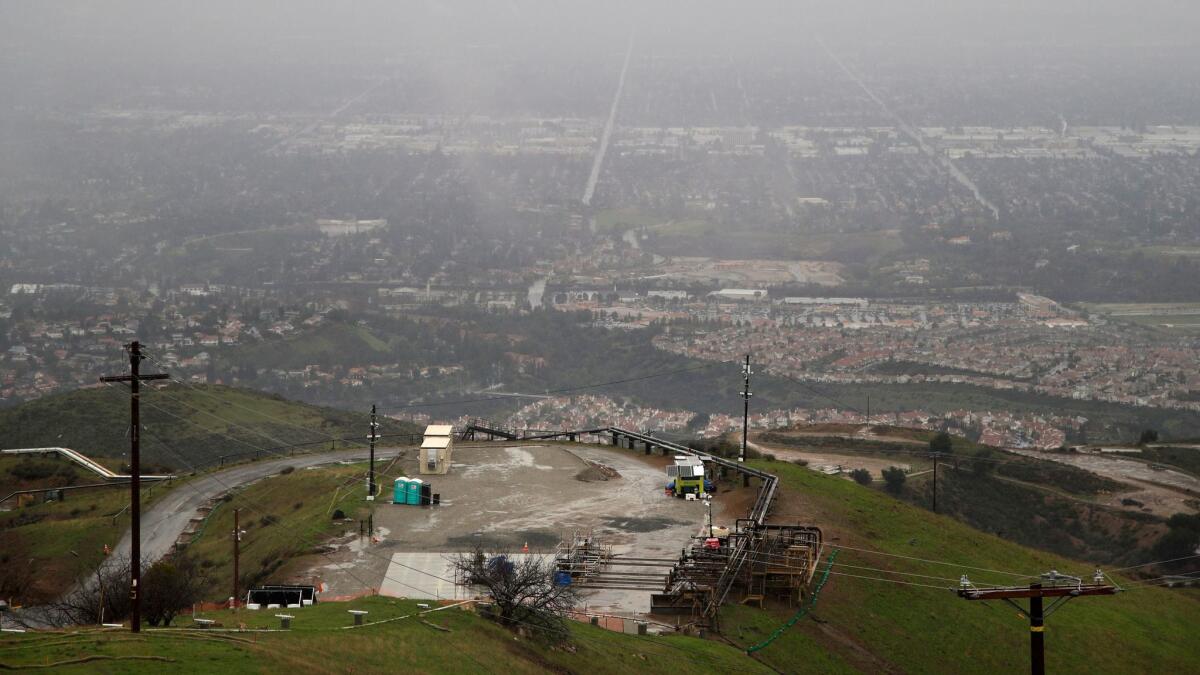Southern California Gas to pay $8.5 million to settle lawsuit over Aliso Canyon leak

Southern California Gas Co. will pay $8.5 million to settle a lawsuit filed by air quality regulators over the Aliso Canyon gas leak and will fund a study of community health effects.
The settlement with the South Coast Air Quality Management District, announced Wednesday, resolves a dispute over the months-long leak of methane from the gas company’s Aliso Canyon storage facility above the Porter Ranch neighborhood of Los Angeles.
The facility has been shut down since a well blowout in late October 2015 resulted in the worst methane leak in U.S. history. The invisible gas spewed for nearly four months, causing 8,000 residents to flee their homes, many complaining of headaches, nosebleeds and nausea.
The agreement dedicates $1 million to an air district-sponsored health study, far less than the $5 million air regulators sought a year ago from the utility.
Community leaders, activists and local politicians were quick Wednesday to call the funding insufficient for a comprehensive study of what chemicals residents were exposed to in the gas leak and how it has affected their health.
Issam Najm, president of the Porter Ranch Neighborhood Council, accused the air district of “throwing in the towel” with the settlement and said “the result will be a meaningless study, if any.”
“A true toxicological health study that answers the questions that have been asked since the beginning of this disaster costs a lot more than this — and AQMD knew that,” Najm added.
The South Coast air district filed suit in January 2016, alleging the gas company violated air quality rules and sought up to $250,000 in penalties for each day the leak continued.
Under the settlement, the utility will also pay $5.65 million in emissions-related fees, $1 million of which must be invested in a renewable natural gas demonstration project by Kore Infrastructure, an El Segundo company that produces fuel from wastewater.
The deal also requires the utility to pay $1.6 million to reimburse the agency for air-monitoring costs and $250,000 for its legal fees.
Alexandra Nagy, an organizer with Food & Water Watch, called the deal “an insult to the thousands of families” in the area and urged the air district to give millions of dollars of the emissions fees “back to the community for a real long-term health study.”
The ruptured well was sealed in mid-February 2016, but not before releasing 109,000 metric tons of methane, a potent greenhouse gas, into the atmosphere.
While health officials have blamed symptoms reported by residents on odorants added to the gas, pollution monitoring also detected the carcinogen benzene and other toxic pollutants in the community’s air during the leak.
According to the district, the study will include a detailed assessment of pollution concentrations in the community, a survey of residents’ short-term, long-term and carcinogenic effects and “an analysis of potential associations between reported health effects and exposure to air pollutants.”
“We are pleased to have worked with AQMD to settle this and other matters,” Chris Gilbride, a spokesman for the utility, said in a statement.
The health study, agreed to last year by the gas company and required under an administrative order obtained by the air district, had been in limbo as the gas company and the agency wrangled over the cost.
The abatement order the gas company agreed to in January 2016 required the utility to commit in writing to pay for “reasonable costs” of the health study. The air district then told the company that a meaningful health study would cost up to $5 million, including a $900,000 contract with the National Academies of Sciences, Engineering, and Medicine to establish an independent advisory committee to oversee the effort, records show.
The gas company initially said it was willing to pay only $250,000, records show, and in May 2016 the utility committed to pay up to $400,000, according to the settlement agreement signed this week.
The air district did not pursue a contract with the National Academies because of the price, a spokesman said, and has not yet decided who will oversee the study.
Los Angeles County Supervisor Kathryn Barger criticized the air district for the deal, saying it ignores recommendations of an advisory panel and health authorities, who called for a comprehensive, long-term health assessment.
“This short-sighted settlement does nothing to address the very real health concerns the community has” Barger said, adding that the assessment outlined in the agreement “is not a health study and does not allow for a full accounting of the health impacts of the gas leak and the facility.”
The gas company has faced numerous lawsuits from government agencies and residents and has disclosed spending hundreds of millions of dollars on relocation costs and other expenses related to the leak. Last fall, the utility agreed to pay $4 million to settle criminal charges over the leak from the Los Angeles County district attorney’s office.
The deal comes a few weeks after state regulators announced the underground storage facility was safe to open at a diminished capacity.
The gas company has pushed to resume operations at Aliso Canyon, calling it essential for the region’s energy supply.
Porter Ranch residents and some elected officials are fighting any additional gas injections at the facility until state investigators determine the cause of the leak, and many want the facility closed for good.
ALSO
Driver arrested after wild police chase through South L.A.
Here’s why California won’t lift drought restrictions despite epic rain and snow
Police searching for suspect in Long Beach robbery, sexual assault cases with elderly victims
UPDATES:
6:50 p.m. This article has been updated with additional details throughout and reaction from community leaders and politicians.
This article was originally published at 2:30 p.m.
More to Read
Sign up for Essential California
The most important California stories and recommendations in your inbox every morning.
You may occasionally receive promotional content from the Los Angeles Times.











